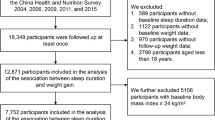Abstract
Objective
Previous research suggests that sleep duration is associated with obesity and weight gain. However, the majority of these studies are of cross-sectional design, with only a few cohort studies. In order to validate previous findings in a more real-world context, we evaluated the association between sleep duration, obesity, and weight gain in a large, 3-year cohort study.
Methods
A retrospective cohort study was conducted involving 21,469 apparently healthy individuals aged 20 years or older who underwent annual health check-ups at the Center for Preventive Medicine, St. Luke’s International Hospital, between 2005 and 2008. The participants were divided into four groups according to their self-reported average nightly sleep duration (≤5, 6, 7, and ≥8 h). We identified individuals with obesity (body mass index ≥25 kg/m2) and weight gain. Multivariate linear regression analysis and logistic regression analysis were used to explore the association between these variables and sleep duration, adjusting for age, gender, alcohol consumption, current smoking, past medical history, and level of physical activity.
Results
Compared with those who slept 7 h, the individuals who slept ≤5 h night were more likely to experience weight gain (β coefficient = 0.03; 95% CI = 0.03–1.1) and to become obese (OR = 1.5; 95% CI = 1.1–2.0). No significant difference was seen between subjects who slept more than 8 h and those sleeping 7 h (OR = 1.3; 95% CI = 0.9–1.8).
Conclusion
Short sleep (≤5 h) is significantly associated with weight gain and obesity in both male and female adults.
Similar content being viewed by others
References
Organisation for Economic Co-operation and Development.Obesity and the Economics of Prevention: Fit not Fat. Available at: http://www.oecd.org/document/31/0,3343,en_2649_33929_45999775_1_1_1_1,00.html Accessed Oct 2, 2010.
The Ministry of Health, Labour and Welfare in Japan. National health and Nutrition surveillance, 2004 Available at: http://www.mhlw.go.jp/houdou/2006/05/h0508-1a.html Accessed June 1, 2010.
Kotchen TA (2010) Obesity-related hypertension: epidemiology, pathophysiology, and clinical management. Am J Hypertens 23(11):1170–1178
Whitmore C (2010) Type 2 diabetes and obesity in adults. Br J Nurs 19(14):880–882–886
Sayeed MA, Mahtab H, Latif ZA, Khanam PA, Ahsan KA, Banu A, Azad Khan AK (2003) Waist-to-height ratio is a better obesity index than body mass index and waist-to-hip ratio for predicting diabetes, hypertension and lipidemia. Bangladesh Med Res Counc Bull 29(1):1–10
Hubert HB, Feinleib M, McNamara PM, Castelli WP (1983) Obesity as an independent risk factor for cardiovascular disease: a 26-year follow-up of participants in the Framingham Heart Study. Circulation 67(5):968–977
Jousilahti P, Tuomilehto J, Vartiainen E, Pekkanen J, Puska P (1996) Body weight, cardiovascular risk factors, and coronary mortality. 15-year follow-up of middle-aged men and women in eastern Finland. Circulation 93(7):1372–1379
Stevens J, Cai J, Pamuk ER, Williamson DF, Thun MJ, Wood JL (1998) The effect of age on the association between body-mass index and mortality. N Engl J Med 338(1):1–7
Cappuccio FP, Taggart FM, Kandala NB, Currie A, Peile E, Stranges S, Miller MA (2008) Meta-analysis of short sleep duration and obesity in children and adults. Sleep 31(5):619–626
Taheri S, Mignot E (2010) Sleep well and stay slim: dream or reality? Ann Intern Med 153(7):475–476
Watanabe M, Kikuchi H, Tanaka K, Takahashi M (2010) Association of short sleep duration with weight gain and obesity at 1-year follow-up: a large-scale prospective study. Sleep 33(2):161–167
Nishiura C, Hashimoto H (2010) A 4-year study of the association between short sleep duration and change in body mass index in Japanese male workers. J Epidemiol 20(5):385–390
Theorell-Haglow J, Berne C, Janson C, Sahlin C, Lindberg E (2010) Associations between short sleep duration and central obesity in women. Sleep 33(5):593–598
Japan Society for the Study of Obesity. Determination of obesity and diagnostic ciriteria of adiposity. Available at: http://wwwsoc.nii.ac.jp/jasso/message/pdf/message_0901.pdf Accessed Oct 2, 2010.
Hasler G, Buysse DJ, Klaghofer R, Gamma A, Ajdacic V, Eich D, Rössler W, Angst J (2004) The association between short sleep duration and obesity in young adults: a 13-year prospective study. Sleep 27(4):661–666
Lyytikainen P, Rahkonen O, Lahelma E, Lallukka T.(2010) Association of sleep duration with weight and weight gain: a prospective follow-up study. J Sleep Res; 10.1111/j.1365-2869.
Horne J (2008) Too weighty a link between short sleep and obesity? Sleep 31(5):595–596
Vorona RD, Winn MP, Babineau TW, Eng BP, Feldman HR, Ware JC (2005) Overweight and obese patients in a primary care population report less sleep than patients with a normal body mass index. Arch Intern Med 165(1):25–30
Patel SR (2005) Shared genetic risk factors for obstructive sleep apnea and obesity. J Appl Physiol 99(4):1600–1606
Japanese Ministry of Health, Labour and Welfare. Total number of patients in common disease 2005. Available at: http://www.mhlw.go.jp/toukei/saikin/hw/kanja/05/05.html Accessed Feb 28, 2011.
Bridgeman B (1992) A comparison of quantitative questions in open-ended and multiple-choice formats. J Educ Meas 29(3):253–271
Lam JC, Ip MS (2010) Sleep & the metabolic syndrome. Indian J Med Res 131:206–216
Acknowledgements
We gratefully acknowledge Dr Toshiko Kawakita for contributing data of the Center for Preventive Medicine at St. Luke’s International Hospital.
Conflict of interest
None
Author information
Authors and Affiliations
Corresponding author
Rights and permissions
About this article
Cite this article
Kobayashi, D., Takahashi, O., Deshpande, G.A. et al. Association between weight gain, obesity, and sleep duration: a large-scale 3-year cohort study. Sleep Breath 16, 829–833 (2012). https://doi.org/10.1007/s11325-011-0583-0
Received:
Revised:
Accepted:
Published:
Issue Date:
DOI: https://doi.org/10.1007/s11325-011-0583-0




